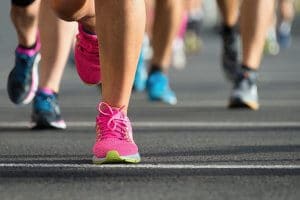
The Pittsburgh Marathon
If you’ve been training for the Pittsburgh Marathon the last few months, chances are that at one time or another your feet have hurt. Foot pain in common in marathon runners and here at Beaver Valley Foot Clinic we can help.
As a Pittsburgh Marathon race day courtesy, this Pittsburgh Podiatrist will remain open for calls and emergency treatments the during and after the Pittsburgh Marathon 2017. If you need an emergency foot doctor, or a foot clinic open during the race, we are here for you.
Heel pain and plantar fascia care are also available
We have eswt for those who have pushed through the pain for months to the point where you have chronic plantar fasciitis.
Warts are common on areas of friction, as the virus can get past the defenses of irritated skin. We have Laser wart therapy for your comfort.
Weather it’s a sprained ankle needing an immediate ankle brace or cast, or blister care, we are there for you! we have fracture walkers and cast boots in stock and on hand for your immediate use, with out waiting for hours in a busy Emergency Room. Xrays are taken on premises and read by a DOCTOR IMMEDIATELY!
Pittsburgh Marathon
Over training, or doing too much running too quickly often leads to more chronic foot injuries, like stress fractures. Metatarsal stress fractures and calcaneal stress fractures are some of the most common running injuries we see.
Heel Pain
Achilles tendinopathy (Achilles tendon injury) can lead to stiffness and pain on back of the heel or running up the back of the leg. Most common among athletes, achilles tendinopathy, can severely diminish your ability to participate in many common activities. Achilles tendinopathy does occur at any age regardless of your activity level or profession.
Bursitis is the inflammation of infection of a bursa—a small fluid sac cushioning and lubricating tissues that rub against each other. The brusa on your heel is prone to inflammation causing swelling and pain. Some simple changes to your daily habits can go along way in preventing and easing the heel pain.
- Maintain a healthy BMI and weight.
- Stretch your calf pointing your toe slightly in. You should be warmed-up—either from walking or biking—before you attempt to fully stretch your Achilles tendon.
- Stay away from overly-strenuous activities.
- Always use shoes with appropriate padding. Consider over-the-counter heel pads or shoe inserts during activities that place stress on your heels.
- Do not use ill-fitting shoes or footwear that presses on the backs of your heel.
What should marathon runners do if they experience sudden onset of severe heel pain during a race?
If a marathon runner experiences a sudden onset of severe heel pain during a race, it’s important to take appropriate steps to address the situation while ensuring safety. Here’s what they should consider doing:
- Stop Running: If the pain is severe and interfering with your ability to run, it’s best to stop running immediately to prevent further injury.
- Assess the Pain: Try to assess the location and intensity of the pain. Is it localized to a specific area? Is it a sharp, stabbing pain or a dull ache?
- Stretch and Massage: Gently stretch and massage the affected area, if possible. This may help relieve some discomfort.
- Walk and Rest: If the pain is manageable, you might choose to walk slowly and assess if it improves. If the pain is unbearable, consider seeking medical help.
- Hydrate and Refuel: Dehydration or inadequate nutrition can contribute to muscle cramps and pain. Make sure you’re properly hydrated and have consumed enough energy during the race.
- Seek Medical Aid: If the pain is severe and doesn’t subside with walking, it’s advisable to seek medical aid at the nearest medical tent or aid station on the race course.
- Communicate with Race Officials: Inform race officials about your condition so they can provide assistance or make arrangements if needed.
- Follow Medical Advice: If you receive medical attention, follow the advice provided by the medical staff. They may recommend rest, ice, compression, and elevation (RICE) or further evaluation.
- Know Your Limits: While it’s disappointing to stop during a race, prioritize your health and safety. Continuing to run through severe pain could lead to more serious injury.
- Plan for Future Races: If the pain subsides and you decide not to continue the race, consider discussing the situation with a sports medicine professional to prevent a recurrence in future races.
Schedule an appointment today with an area Pittsburgh podiatrist 878-313-FEET (3338)!
Click Here to E-mail Dr. Christina Teimouri
Hours of Operation
Monday – Friday 8:00 am – 5:30 pm
Evenings and weekend available for emergencies



